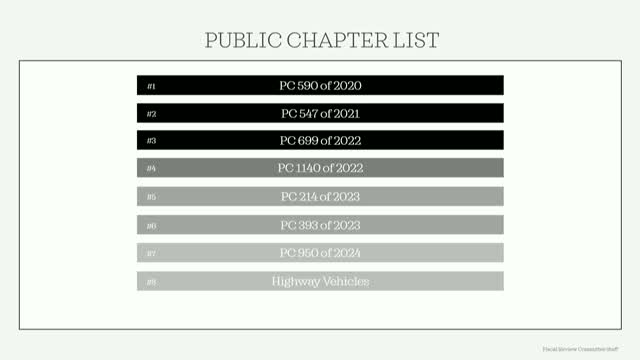Tennessee's New Legislation Increases Per Diem Rates and Expands Youth Education Programs
August 13, 2025 | Fiscal Review, Joint, Committees, Legislative, Tennessee
Thanks to Scribe from Workplace AI , all articles about Tennessee are free for you to enjoy throughout 2025!

This article was created by AI using a video recording of the meeting. It summarizes the key points discussed, but for full details and context, please refer to the video of the full meeting. Link to Full Meeting
One significant topic was Public Chapter 590 of 2020, which lifted per diem rate restrictions for utility district boards in Blount County. This change is projected to increase local expenditures by approximately $16,200 annually, allowing board members to receive up to $300 per meeting instead of the previous $150. The committee noted that while initial costs were lower than expected, recent years have seen expenditures exceed projections.
Another important discussion centered on Public Chapter 547 of 2021, which established a pilot program for foster care youth outreach at higher education institutions. The program, initially set to terminate in June 2024, has expanded significantly, with participation rising from the anticipated five institutions to 18. The financial impact has also grown, with actual costs reaching $244,600 compared to initial estimates.
The committee also reviewed Public Chapter 699 of 2022, which introduced a licensing system for transporting wine and other alcoholic beverages. The legislation aimed to generate state revenue through licensing fees, although actual revenue has fallen short of expectations, with only three licenses issued instead of the projected four.
Additionally, the Mental Health Treatment Act of 2022 was discussed, which aims to enhance mental health court programs across Tennessee. The estimated state expenditure for this initiative is $5.7 million in the first year, with local costs expected to be around $450,000. The committee reported that 19 mental health treatment courts are now operational, with funding gradually aligning with initial estimates.
Public Chapter 214 of 2023, which created a new licensure for eyelash specialists, was also reviewed. The implementation of this chapter has faced delays due to regulatory processes, resulting in lower-than-expected revenue from licensing fees.
The meeting concluded with a discussion on the franchise tax refund legislation, which has resulted in significant financial adjustments. The committee confirmed that $1.55 billion was transferred to a refund fund, with $1.44 billion refunded to taxpayers, although ongoing tax collection impacts remain challenging to quantify.
Overall, the committee's discussions underscored the complexities of fiscal forecasting and the importance of monitoring the financial implications of new legislation on both state and local levels. The next steps involve continued oversight of these programs to ensure they meet their intended financial and operational goals.
Converted from Tennessee Joint Committee - Fiscal Review Aug 13, 2025 meeting on August 13, 2025
Link to Full Meeting
Comments
View full meeting
This article is based on a recent meeting—watch the full video and explore the complete transcript for deeper insights into the discussion.
View full meeting
